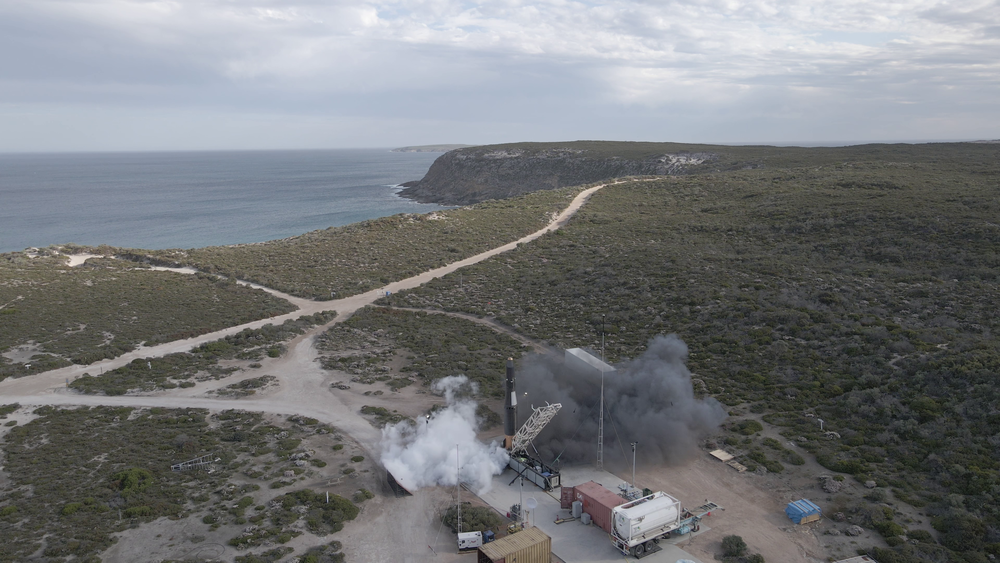
As Australia expands its space sector, the nation’s north is crucial. Among other advantages, its geography provides critical orbital mechanics. The Northern Territory’s Nhulunbuy launch site, being established by Equatorial Launch Australia, lies approximately 12.5 degrees south of the equator.
A rocket picks up energy from the earth’s rotation, and the effect is greatest at or near the equator. So, the closer to the equator a rocket is launched, the lower the launch cost. Sites such as Nhulunbuy offer launches into equatorial low-earth orbit at a lower cost per kilogram—which also makes them ideal sites from which to launch larger payloads.
With backing for a sovereign launch industry from the Australian Space Agency, Whaler’s Way in South Australia, run by Southern Launch, and the Bowen Orbital Spaceport in north Queensland are emerging as additional sites. Gilmour Space Technologies has just won a $157 million grant, as part of the government’s modern manufacturing initiative, to build launch vehicles, which will dramatically boost the establishment of the Bowen spaceport.
The Department of Defence considers sovereign launch a key element of its new space strategy, noting that: ‘Assurance of access to space capabilities in a congested, contested and competitive space environment cannot be achieved unless Defence develops a space architecture that is focused on capabilities that are resilient, [and] can be reconstituted if compromised and defended if under attack.’
That ability to reconstitute the system is essential to ensure access to space. The strategy says: ‘To sustain a mix of orbital regimes and satellite classes and respond quickly to reconstitute battle damaged assets, Defence anticipates it will need access to a responsive and assured space launch capability in the future.’
This key requirement cannot be met by continued reliance on external launch providers. The head of Defence Space Command, Air Vice Marshal Catherine Roberts, told the 2022 Air and Space Power Conference: ‘There will be a launch capability in Australia, but it needs to be commercially viable. Defence won’t have enough launches by ourselves, but there are a lot of customers out there.’
The government’s support in its space strategy, and in its space strategic update, for sovereign launch to support Defence requirements is very welcome. Important too was the announcement at the Australian Space Forum that the government no longer plans to introduce partial recovery of the costs of launches. This signals that Australia’s space policy has matured and the nation can work closely with allies to strengthen space resilience. Northern Australia must play a key role in this national endeavour.
With launch comes a range of services, including payload integration, range safety, launch tracking and telemetry. As the establishment of the Nhulunbuy site proceeds, a ‘space coast’ approach could include local development, design and manufacturing of small satellites and components to allow easier payload integration on site. That could complement the rapid development of commercial space in South Australia, particularly in proximity to Adelaide’s Lot Fourteen site embracing space, defence and general high-tech and creative industries, and with the Space Park established by the South Australian Space Industry Centre.
Excessive competition must not slow development of Australia’s space strategy. The establishment of a vibrant commercial space industry in southern states shouldn’t detract from the importance of northern Australia, especially for launches.
It’s also important not to ignore the potential benefits of northern Australia’s location for ground-based space domain awareness, including as part of Defence’s Joint Project 9360, to complement the space surveillance telescope and C-band radar facility at Exmouth in Western Australia. The Northern Territory’s dark skies, away from large urban areas, are ideal for space surveillance and for experimenting with new space surveillance technologies such as networked sensors, demonstrated by Lockheed Martin’s FireOPAL, and laser-based systems developed by EOS Australia. The NT can support the operational requirements of the nations involved in the Combined Space Operations initiative through Operation Dyurra as part of Operation Olympic Defender.
Collaboration in space under AUKUS and the Quad opens up potential for northern spaceports to support launches and returns for Australian and allied launch vehicles. That will allow Australia to deliver critical space support capability to allies and partners during a crisis and to launch replacements if satellites are attacked by an adversary. Burden-sharing in orbit will strengthen credible space deterrence against Chinese and Russian counterspace capabilities that will only grow over time.
It’s important to consider ‘what ifs’ as new ways of accessing and utilising space become available. As Australia develops a sovereign launch capability, companies should explore reusable rocket technologies that may open up global logistics through point-to-point services between spaceports. Government support for launch and return means Australia can support those logistics in addition to offering regular (potentially daily) launches, establishing megaconstellations of satellites, helping build large structures in orbit and supporting lunar activities including mining.
Space 2.0 has challenged the dominance of Apollo-era state-run space endeavours as the cutting edge of innovation, leading to Space 3.0, which will enable humanity to truly become a spacefaring civilisation.
For northern Australia, this can be opened up to much more than launch sites at Nhulunbuy and Bowen. Bold vision and large ambition can shape Australia’s future in space, and now is the time for those states and territories best able to contribute to move quickly. A cautious, risk-averse approach will likely see opportunities slip away. The ancient saying ‘Fortune favours the bold’ was never more apt or timely.

